I’ve been noticing how easy it is for the practice of co-production to remain on the margins of healthcare policy. It’s had some headwind in mimicking a commercial proposition of user design, but the market doesn’t operate cleanly in public healthcare. It’s had headwind in the growth of equality and rights-based value systems that recognise the importance of involvement and voice.
But in the particular space of care, where activists face double-binds of social, cultural and physiological barriers to agency, there’s a scarcity of contexts in which the primary value of co-production is a given in itself.
So the process of participating in decisions about policies that affect you remains on the margins. Opportunistic, fragile, dependent on ‘benefactors’.
So why is this?
We must ‘do’ co-production because it’s in the policy lexicon. There are requirements to engage people in policy processes, and duties to look out for differential impacts on people with protected characteristics.
But we are still – in the main – operating on the assumption that the value is in complying with systems imposed on us. Rather than an irrefutable value proposition that makes sense in our own contexts.
The implications from this are that it is costly and it’s not easy to do.
What might change this?
We cannot ‘fix’ our healthcare systems in the isolation of hospitals and social care departments. But our policy mechanisms are still driven by this institutional organising model, with a prescribed set of resources and levers for change.
The production of healthcare sits within a much broader system than social care and hospital services. Community wellbeing is the result of a network of influencing forces, with a multiplicity of actors and assets that affect it all the time.
An irrefutable value proposition for co-production in itself, requires a ‘worldview’ that experiences networks as the primary organising model.
In this community wellbeing context, co-production is the natural state of working with the whole network of actors and assets.
For networks to thrive, we need information to flow (what is occurring, what opportunities and limitations do we have), and the participation of actors (who is able to give and get at the same time).
In this way it moves the value proposition from a model of (inadvertent) containment and compliance to one of building (networks of) coalitions.
But it cannot happen without acknowledgement that the purpose of co-production in healthcare is to build systems for all of us to care and be cared for (participation that is at once giving and receiving). Urban design, school curriculums, retail and tech consumption. Beyond our usual topics of deliberation and dialogue in healthcare. Beyond the people that we would imagine involving in such conversations.
Innovations with a moral imperative don’t remain on the margins because we haven’t tried hard enough or because we don’t care. It is where they are part of systems that are increasingly not fit for purpose, but incredibly hard to shift because of reinforcing dynamics.
Not least the losses that come with the acknowledgement of system failures and the resultant transitions. Not least the personal failure we feel to see our own heroic efforts as inevitably constrained by the systems we have now. But now we need heroes to understand and acknowledge the limits of our current systems, and to build places where more of us can give and receive care.
We can re-imagine co-production once again, as the natural state of how we organise ourselves to care and be cared for.
Let’s use our tales of co-production wisely, once more.
Next Series of ‘Everyday Futures’ runs from September to November, Tuesdays 1245 to 1345.
The Behavioural Series
Three different frameworks that help us work with people with different ‘worldviews’, experiencing diversity as a design feature and not a fault in working with change.
Session 1: Three Horizons, understanding our stories of the present and future – 19 September
Session 2: Futures Triangle, working with different forces and archetypes – 17 October
Session 3: Causal Layered Analysis, understanding our systems and worldviews – 21 November
Tickets are £10 for each single session, 3 for 2 on the series. You are welcome to come to an individual session, and encouraged to come to all 3.
